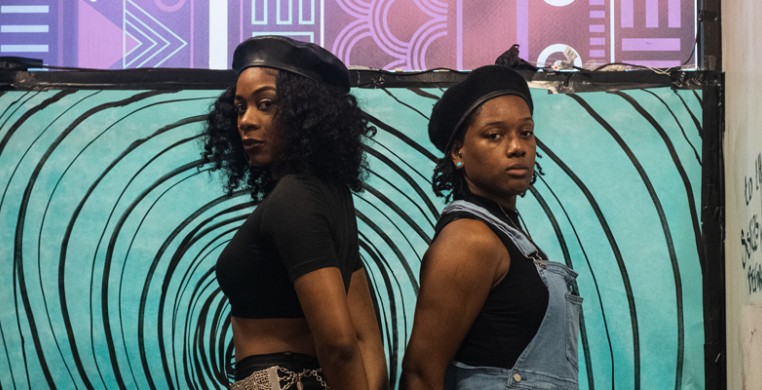UPDATE: The new seechicagodance.com will launch March 31st. Click here to learn more.
The Multitudes of “Panther Women”
I nestled into my seat slightly late in what appeared to have once been a storefront in South Chicago. It now serves as the fictive headquarters for the “Black Panthers” and the stage for the immersive choreopoem “Panther Women: An Army for Liberation,” Directed by Myesha-Tiara and choreographed by Deja Hood.
First, I was engulfed by the collaged water-colored walls, transitioning from indigo to sky blue to violet. Headshots of historical women from the Black Panther party were gently plastered in between the imperfections of the paint. To my left, was the door and a little empty window nook with an adjacent altar. To my right, were a few more chairs arranged in a semicircle, occupied and unoccupied. In front of me, was a small empty space which would serve as the stage for seven Panther women to share their voluptuous voices and stories through song, play, passion, gesture and dance. Slightly intimidated by the intimacy of the narrow space, I leaned forward and listened to the lead panther woman who took center stage.
The 90 minute choreopoem, which was set in the 60’s and 70’s, was reminiscent of Ntozake’s Shange’s “For Colored Girls,” as it included resounding movement to powerful prose, except that in “Panther Women,” the women were not distinguished by color but by the personalities of the diverse women of the actual Panther Party.
Packed with historical content, the performance documented the life-sustaining programs initiated by the majority women membership in the Black Panther Party. The choreopoem reminded us that it was the women who birthed nourishing programs that met the needs of the black community with programs such as free breakfast for school children, free healthcare and WIC for mothers and the Oakland Community School.
Naturally, there were the fiery fist jolts into the air, mighty roars and a slew of frank attitude. Something about the script reminded me of a 90’s romcom, maybe Love Jones, maybe Boomerang with the poetry, the black girl sass, the sisterhood and raw conversation. And then there was the dancing that at times lent itself to gesture, to breath and to simple ways of being tactile, effective for the tender moments in the script, and especially moving when in the unique environment of the space.
A moment comes to mind in the window nook, when all seven performers curled onto the step in the window seat and laid their heads upon one another, simply breathing and supporting one another. It was a beautiful moment, reminiscent of the actual ways the women of the Black Panther Party held one another together through the tumultuous times they endured, including being imprisoned and unable to spend time with their children, enduring the murders of many of their friends, husbands and comrades.
The electric cast, Maya T.W. Jones, Alexis Dupree, Jerluane “Jae” Jenkins, Taylor Elie Talhame, Nia Vines, A’Keisha Lee and kendra renee did more than calling the names of the prominent women in the party, Erika Huggins, Assata Shakur, Angela Davis, Kathleen Cleaver, Evon Carter. They also invoked their spirits.
Although the dancing cycled us through a range of emotions from humor to liberation to rage, we also enjoyed the other end of the spectrum, with play and sensuality. In classic black berets and various styles of cut-off jean shorts and overalls, the panther women got down. Standing, sultry body rolls melted to the floor. In a uniformed line and sometimes through slight windows, they found their unapologetic snakelike shapes of pleasure.
Nostalgic hand clap games, chants and cheer-like exclamations were also a big voice in the choreopoem, accentuating their collective rhythm but also their innocence and girlhood. Many of the women of the Panther Party got involved with the organization at a very young age. They literally came of age together, creating an inextinguishable bond that carried throughout the choreopoem, and also in real life.
Although the choreography gelled naturally on the cast, the poetry was equally moving. Some of the lines that lingered included, “Where should the things of black women be kept?” “With the North Philly wind behind her hair.” “When we are the earth again, they will know our power.”
Many of us think we know the story of the Black Panthers, through various films, photos or stories we have heard from the more popular members of the party such as Fred Hampton and Angela Davis. However, “Panther Women” encourages us to take a closer look into the lives of the members of the party, especially the women.
“Panther Women” highlights our unsung sheroes and leaves us with a thirst to go even deeper and be empowered to find ways to incorporate their ways of service into our lives today. It also inspires us to lean in, strengthen our sisterhood and find ways to not just serve but to be our bold, beautiful selves.
--------------
Panther Women: An Army for the Liberation runs Thursdays-Saturdays at 7:30pm., and Sundays at 2pm through May 27, at the Davis, 1825 E. 79th St. Tickets are $15-20.

